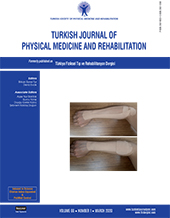The effects of kinesiotaping on wrist extensor strength using an isokinetic device in patients with chronic lateral epicondylitis: A randomized-controlled trial
2 Department of Physical Medicine and Rehabilitation, Ankara Gaziler Physical Therapy and Research Hospital, Ankara, Turkey DOI : 10.5606/tftrd.2020.3298 Objectives: This study aims to evaluate short-term effects of kinesiotaping (KT) on pain, arm function, grip strength, and wrist extensor strength in patients with chronic lateral epicondylitis (LE).
Patients and methods: A total of 48 patients (32 females, 16 males years; mean age 47.6 years; range 27 to 67 years) with chronic LE were randomly assigned to either KT group (n=27) or sham group (n=21). Pain intensity with visual analog sclae (VAS), arm pain and function with Patient-Rated Tennis Elbow Evaluation Questionnaire (PRTEE), grip strength with hand dynamometer, and wrist extensor strength by an isokinetic device were evaluated before and at the end of the treatment. The KT stayed on for five days and the procedure was repeated for three times.
Results: Although pain and functional levels of patients with chronic LE were significantly improved both with KT (pain, p=0.001; function, p=0.001) and sham groups (pain, p=0.001; function, p=0.001), no significant difference was observed between the groups.
Conclusion: Both KT and sham taping provided similar improvement in pain relief through arm functions in patients with chronic LE.
Keywords : Function, kinesiotape, lateral epicondylitis, pain
















